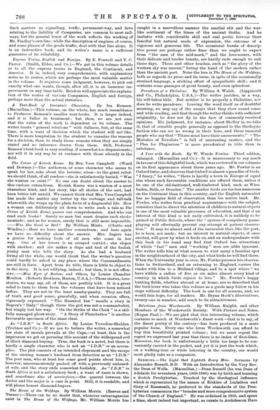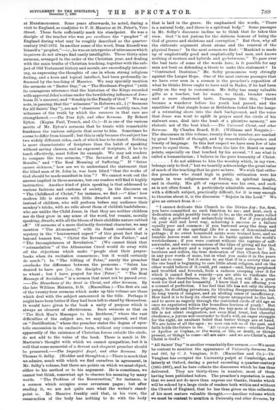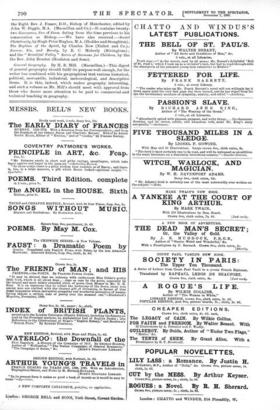SERMONS.—The Light that Lighteth Every Man. Sermons by Alexander Russell,
B.D. With an Introduction by the Very Rev. the Dean of Wells. (Macmillan.)—Dean Russell (he was Dean of Adelaide for seventeen years, 1869-1886) was by birth and training a Scotch Presbyterian. Touched by the theological influence which is represented by the names of Erskine of Linlathen and Story of Roseneath, lie preferred to the standards of the Pres- byterian communion the "broader and more comprehensive system of the Church of England." He was ordained in 1850, and spent a time, short indeed but important, as curate to Archdeacon Hare at Hurstmonceaux. Some years afterwards, he acted, during a visit to England, as coadjutor to F. D. Maurice at St. Peter's, Vere Street. These facts sufficiently mark his standpoint. He was a disciple of the teacher who was par excellence the "prophet" of England during what may be roughly described as the quarter- century 1847-1872. In another sense of the word, Dean Russell was himself a "prophet,"—i.e., he was an interpreter of utterances which inquirers do not always find easily intelligible. These thirty-nine sermons, arranged in the order of the Christian year, and dealing with the main truths of Christian teaching, together with the sub- ject of Old Testament history and morals, are exceedingly interest- ing, as expressing the thoughts of one in whom strong religious feeling, and a keen and logical intellect, had been profoundly in- fluenced by the teaching of Maurice. We may specially mention the sermons on "Easter Day," on " The Herdman-Prophet " (with its courageous utterance that the historian of the Kings recorded with approval Jehu's crime under the bewildering influence of Jero- boam IL's success), and "Sonship in the Family of God." We may note, in passing, that the " witnesses" in Hebrews xii., 1 (" Sermons for All Saints' Day "), are not " observers " of the earthly race, but witnesses of the truth by which the runners in that race are strengthened. —The True Life, and other Sermons. By Robert Eyton. (Kegan Paul, Trench, and Co.)—It is one of the various merits of Mr. Eyton's sermons that he treats with remarkable frankness the various subjects that occur to him. Sometimes he seems to differ from himself ; but this is only because the subject has two widely different sides, each of which has to be stated. Nothing is more characteristic of Scripture than the habit of speaking without saving clauses, and an exponent of Scripture, if he is to teach effectively, must follow its example. We may ask readers to compare the two sermons, "The Invasion of Evil, and its Results," and " The Real Meaning of Suffering." If " Satan causes sickness," how are we to understand the statement that the blind man of St. John ix. was born blind "that the works of God should be made manifest in him " ? We cannot work out the answer implied in these sermons, but our readers will find it highly instructive. Another kind of plain speaking is that addressed to various fashions and customs of society. In the discourse on " The Childhood of Christ," for instance, we find :—" Alas I how modern life is strewn with little dwarfed men and women, instead of children, who will perform before any audience their monkey's tricks, with no relic about them of childish bashfulness ; who are unlike the Child Jesus, in that they are neither children nor do they grow in any sense of the word, but remain, morally speaking, dwarfs, with all the bloom of their childlike nature rubbed off." Of sermons of a more distinctly doctrinal character, we may mention " The Atonement," with its frank confession of a mystery in the "heavenward aspect" of this great fact that is beyond human ken, " Christ the Reveader of the Father," and " The Incompleteness of Revelation." (We cannot think that " retranslation " of the Athanasian Creed would do away with all the objections which make " people shut their prayer- books when its recitation commences ; but it would certainly do much.") In " The Sifting of Peter," surely the preacher overlooks the difference between the pronouns : " Satan has desired to have you [i.e., the disciples] that he may sift you as wheat ; but I have prayed for thee [Peter]." " The Real Message of Socialism " is a sermon that must not be passed over. —The Blessedness of the Dead in Christ, and other Sermons. By the late William Maturin, D.D. (Macmillan.)—The first six out of the twenty-four sermons which make up this volume are those which deal with the subject announced in the title. Perhaps it might have been better if they had been left to stand by themselves. It would have given to the book a unity of purpose which is always an element of effectiveness. Such sermons as that on " The Rich Man's Messages to his Brethren," where the vast difficulties of the subject are, we may say, ignored, and that on "Justification," where the preacher states the dogma of apos- tolic succession in its exclusive form, without any consciousness apparently of the existence of Christian forces outside the circle, do not add to the value of the book. There is much in Dr. Marturin's thought with which we cannot sympathise, but it is well that some memorial of a devout and eloquent preacher should be preserved.—The Imperfect Angel, and other Sermons. By Thomas G. Selby. (Hodder and Stoughton.)—There is much that we admire, much with which we find ourselves in agreement, in Mr. Selby's volume, but there are points on which we must object, either to his method or to his argument. He is sometimes, we cannot but think, somewhat apt to obscure his meaning by many words. " The Problem of the Resurrection," for instance, is a sermon which occupies some seventeen pages ; but after reading it, we are not quite sure what the writer's stand- point is. Mr. Maurice frankly said that, in his view, the resumption of the body has nothing to do with the body that is laid in the grave. He emphasised the words, " There is a natural body, and there is a spiritual body." Some passages in Mr. Selby's discourse incline us to think that he takes this view. God " is not jealous for the dubious honour of being the God of graves and skeletons and corruption." But then, why all the elaborate argument about atoms and the renewal of the physical frame? In the next sermon we find : "Mankind is made up of emphatically good and emphatically bad men, and knows nothing of neuters and hybrids and go-betweens." To pass over the bad taste of some of the words here, is it possible for any man not bent on defending a thesis to make this statement ? In "Contrasted Destinies," Mr. Selby pronounces very strongly against the Larger Hope. One of the most curious passages that we have ever seen in a sermon is the preacher's exposition of what he thinks Dives ought to have said in Hades, if he had been really on the way to restoration. Mr. Selby has many valuable gifts as a teacher, but he wants, we think, broader views and a more chastened taste. Passages like this, " David became a wanderer before his youth had passed, and the sanctities of that simple home at Bethlehem faded like the lamps of a retreating shore into the dark background, and the voice that Jesse was wont to uplift in prayer amid the circle of his stalwart sons, died into the hush of a plaintive memory," are rhetoric not of the best kind.—The Universal Christ, and other Sermons. By Charles Beard, D.D. (Williams and Norgate.)— The discouries in this volume, twenty-four in number, are marked by great breadth of thought, and by remarkable eloquence and beauty of language. In this last respect we have seen few of late years to equal them. We differ from the late Dr. Beard on many points, especially on that touched by his avowal, " I am what is called a humanitarian ; I believe in the pure humanity of Christ.
I do not address to him the worship which, in my view, belongs only to God ;" but we heartily acknowledge the great value of much of the teaching that he gave us here. We wish that ortho- dox preachers who stand high in public estimation were his equals in true religiousness of feeling, in spiritual insight, and in charity. His gift of expression was his own, and such as is not often found. A particularly admirable sermon, dealing with a difficult subject, practically difficult, for it is easy enough to theorise about it, is the discourse " Rejoice in the Lord." We give an extract from it :—
"I cannot dedicate this Church to the Divine Joy; for, first, you have committed no such function to me ; and next, such a dedication might possibly turn out to be, as the swift years rolled by, only a profound and melancholy irony. For if you plodded on your dull and level way, achieving a success or a failure equally poor and common : if you bartered away the deep and wide things of the spiritual life for a mess of denominational pottage : if no sweet household saints were trained here, and no humble heroes went out hence to do battle against the world's wretchedness : if you were content without the rapture of self- surrender, and were unconscious of the bliss of giving all for God —what a mockery and a reproach would your name be ! No, brethren and sisters, the true dedication of this Church lies not in any poor words of mine, but in what you make it in the years that are to come. Yet it seems to me that if in a society that on the one hand is beginning to care little about religion, and on the other would believe if it could, yet cannot—and, being perplexed and troubled and feverish, feels a sadness creeping over it for which it cannot find a remedy—you are able to vindicate the courage, the cheerfulness, the joy of faith, you will do a great work for God and for humanity. I know that I am offering you a counsel of perfection. I too feel that life has not only its sharp pangs, its disabling privations, its blinding disappointments, but its long tracts of languor, and an abiding sense of insufficiency. How hard it is to keep its cheerful vigour unimpaired to the last, and to move as eagerly through the restricted circle of old age as once we expatiated within the boundless horizon of youth ! But still, 0 friends and fellow-pilgrims, the key-note of the Christian life is not silent resignation, not even filial trust, but cheerful obedience, a joyous self-surrender to God's will, an eager struggle for the right, an exultant belief that better things are at hand. We are heirs of all the ages : no man can rob us of the past, and faith holds the future in fee. All things are eurs—whether Paul or Apollos or Cephas, or the world, or life, or death, or things present, or things to come—all are ours : and we are Christ's, and Christ is God's. '
"All Saints' Day" is another remarkably fine sermon.—We must be content to mention the appearance of University Sermons New and Old, by C. J. Vaughan, D.D. (Macmillan and Co.)—Dr. Vaughan has occupied the University pulpit at Cambridge, and latterly at Oxford, during a period exceeding a quarter-century (1861-1887), and he here collects the discourses which he has thus delivered. They are thirty-three in number, most of them having been published before. The preacher's reputation is such that we need not do more than express our thanks, thanks which will be echoed by a large circle of readers both within and without the Church of England, that he has thus given us this collection of his most mature valuable thought.—Another volume which we must be content to mention is University and other Sermons, by the Right Rev. J. Fraser, D.D., Bishop of Manchester, edited by John W. Diggle, M.A. (Macmillan and Co.)—It contains twenty- two discourses, five of them dating from the time previous to his consecration as Bishop.—We have also received :—Social Christianity, by Hugh Price Hughes, M.A. (Hodder and Stoughton); The Baptism of the Spirit, by Charles New (Nisbet and Co.) ; Sorrow, Sin, and Beauty, by R. C. Moberly (Rivingtons) ; and the "Beautiful Valley " Series of Sermons for Children, by the the Rev. John Bruster (Houlston and Sons).
























































 Previous page
Previous page